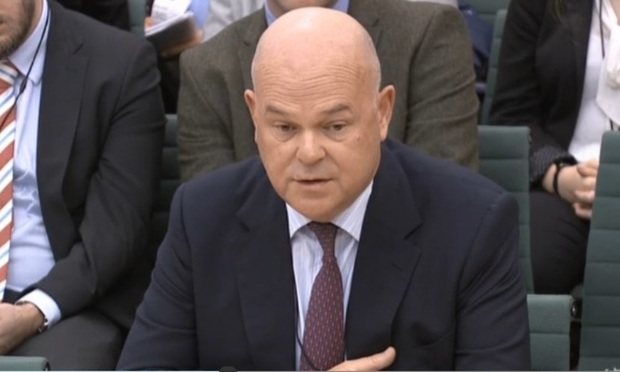Allen & Overy partner questioned by MPs over regrets and reputational damage of role on Weinstein NDA
Women and Equalities Committee quizzes partner over advice on 1998 sexual harassment settlement involving disgraced movie producer
March 28, 2018 at 09:12 AM
3 minute read
Allen & Overy (A&O) partner Mark Mansell has been questioned by MPs over whether he regrets his advice on a historic sexual harassment settlement with disgraced movie producer Harvey Weinstein, as well as the reputational impact of the firm's involvement in the case.
Employment partner Mansell appeared before the Women and Equalities Committee this morning (28 March) for its inquiry into the use of non-disclosure agreements (NDAs) relating to allegations of sexual harassment in the workplace.
He was called to appear after A&O advised Miramax – which Weinstein co-founded – in 1998 when the producer's then-assistant Zelda Perkins accused him of sexual harassment, a role which was detailed in a Financial Times article published last year.
Mansell was asked by committee chair Maria Miller MP whether he regretted the way in which documentation relating to the case had been drawn up, after the committee raised concerns about whether NDAs could be used to prohibit victims from participating in a criminal process.
It emerged during the session that documentation drawn up by Mansell set out a provision which required Perkins to limit her disclosures in cases of civil or criminal legal process.
Asked by Miller whether he regretted drawing up the document in that way, Mansell stated: "If I was looking at dealing with that today, I would make it clearer that the ability to participate in a criminal process was not in any way restricted."
He was also pressed over whether news of the firm's involvement in Zelda Perkins' NDA had been good for A&O's reputation.
Mansell said that while he could not comment on the specifics, any case "where behaviour is criticised and a lawyer or law firm is drawn into that" is "never a good thing for the lawyer or the law firm".
Phillip Davies MP also questioned Mansell over the fees the firm received for its work, with Miller suggesting the committee would write to the firm to request that information.
Perkins, who also appeared before the committee, called for reforms to NDAs, and stated: "I feel let down by the lack of law around them. I'm sure all the lawyers were all working within the legal constraints, but it's more shocking they were able to do that."
She called for a "disincentive" to be created for lawyers to create this type of agreement.
Mansell was joined at the committee by employment partner Tamara Ludlow of Simons Muirhead & Burton, the City law firm that advised Perkins in 1998.
Ludlow and Mansell were asked how the use of NDAs could be improved, with Ludlow stating she would not advise clients to sign an NDA if they were not permitted a copy of it – which Perkins was not allowed.
Mansell added that when lawyers are acting for individuals, they should be as uncombative and as sensitive as possible, recognising that "for somebody to go through harassment is traumatic".
The committee's inquiry comes after the Solicitors Regulation Authority recently warned law firms in England and Wales not to use NDAs to prevent the reporting of professional misconduct within their own businesses, in the wake of several sexual harassment scandals that have rocked the profession.
Baker McKenzie recently commissioned an independent review of its response to a historic allegation of sexual assault of a female associate by a male partner. The associate received a payout and entered into a confidentiality agreement before leaving the firm.
This content has been archived. It is available through our partners, LexisNexis® and Bloomberg Law.
To view this content, please continue to their sites.
Not a Lexis Subscriber?
Subscribe Now
Not a Bloomberg Law Subscriber?
Subscribe Now
NOT FOR REPRINT
© 2025 ALM Global, LLC, All Rights Reserved. Request academic re-use from www.copyright.com. All other uses, submit a request to [email protected]. For more information visit Asset & Logo Licensing.
You Might Like
View All

Jones Day, BCLP & Other Major Firms Boost European Teams with Key Partner Hires
4 minute read
$13.8 Billion Magomedov Claim Thrown Out by UK High Court
Trending Stories
- 1South Florida Attorney Charged With Aggravated Battery After Incident in Prime Rib Line
- 2'A Death Sentence for TikTok'?: Litigators and Experts Weigh Impact of Potential Ban on Creators and Data Privacy
- 3Bribery Case Against Former Lt. Gov. Brian Benjamin Is Dropped
- 4‘Extremely Disturbing’: AI Firms Face Class Action by ‘Taskers’ Exposed to Traumatic Content
- 5State Appeals Court Revives BraunHagey Lawsuit Alleging $4.2M Unlawful Wire to China
Who Got The Work
J. Brugh Lower of Gibbons has entered an appearance for industrial equipment supplier Devco Corporation in a pending trademark infringement lawsuit. The suit, accusing the defendant of selling knock-off Graco products, was filed Dec. 18 in New Jersey District Court by Rivkin Radler on behalf of Graco Inc. and Graco Minnesota. The case, assigned to U.S. District Judge Zahid N. Quraishi, is 3:24-cv-11294, Graco Inc. et al v. Devco Corporation.
Who Got The Work
Rebecca Maller-Stein and Kent A. Yalowitz of Arnold & Porter Kaye Scholer have entered their appearances for Hanaco Venture Capital and its executives, Lior Prosor and David Frankel, in a pending securities lawsuit. The action, filed on Dec. 24 in New York Southern District Court by Zell, Aron & Co. on behalf of Goldeneye Advisors, accuses the defendants of negligently and fraudulently managing the plaintiff's $1 million investment. The case, assigned to U.S. District Judge Vernon S. Broderick, is 1:24-cv-09918, Goldeneye Advisors, LLC v. Hanaco Venture Capital, Ltd. et al.
Who Got The Work
Attorneys from A&O Shearman has stepped in as defense counsel for Toronto-Dominion Bank and other defendants in a pending securities class action. The suit, filed Dec. 11 in New York Southern District Court by Bleichmar Fonti & Auld, accuses the defendants of concealing the bank's 'pervasive' deficiencies in regards to its compliance with the Bank Secrecy Act and the quality of its anti-money laundering controls. The case, assigned to U.S. District Judge Arun Subramanian, is 1:24-cv-09445, Gonzalez v. The Toronto-Dominion Bank et al.
Who Got The Work
Crown Castle International, a Pennsylvania company providing shared communications infrastructure, has turned to Luke D. Wolf of Gordon Rees Scully Mansukhani to fend off a pending breach-of-contract lawsuit. The court action, filed Nov. 25 in Michigan Eastern District Court by Hooper Hathaway PC on behalf of The Town Residences LLC, accuses Crown Castle of failing to transfer approximately $30,000 in utility payments from T-Mobile in breach of a roof-top lease and assignment agreement. The case, assigned to U.S. District Judge Susan K. Declercq, is 2:24-cv-13131, The Town Residences LLC v. T-Mobile US, Inc. et al.
Who Got The Work
Wilfred P. Coronato and Daniel M. Schwartz of McCarter & English have stepped in as defense counsel to Electrolux Home Products Inc. in a pending product liability lawsuit. The court action, filed Nov. 26 in New York Eastern District Court by Poulos Lopiccolo PC and Nagel Rice LLP on behalf of David Stern, alleges that the defendant's refrigerators’ drawers and shelving repeatedly break and fall apart within months after purchase. The case, assigned to U.S. District Judge Joan M. Azrack, is 2:24-cv-08204, Stern v. Electrolux Home Products, Inc.
Featured Firms
Law Offices of Gary Martin Hays & Associates, P.C.
(470) 294-1674
Law Offices of Mark E. Salomone
(857) 444-6468
Smith & Hassler
(713) 739-1250










